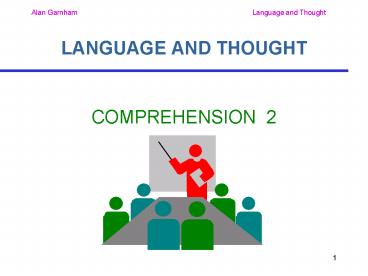Alan Garnham Language and Thought - PowerPoint PPT Presentation
1 / 12
Title:
Alan Garnham Language and Thought
Description:
The mental representation of a sentence does not correspond ... information from the text is understood in the context of ... PROBE: Sweatshirt - at one of ... – PowerPoint PPT presentation
Number of Views:22
Avg rating:3.0/5.0
Title: Alan Garnham Language and Thought
1
LANGUAGE AND THOUGHT
- COMPREHENSION 2
2
BRANSFORDS THREE CLAIMS
- The mental representation of a sentence does not
correspond to any of its linguistic
representations - Comprehension is an integrative process
- pieces of information from different parts of the
text have to be put together properly - Comprehension is a constructive process
- information from the text is understood in the
context of relevant background information that
is not explicitly mentioned in the text
3
INFERENCE IN COMPREHENSION
- Integrative and constructive processes often go
hand in hand. - Background information has to be used to link
pieces of information in different parts of a
text.
4
HAVILAND AND CLARK (1974)
- We checked the picnic supplies
- The beer was warm
- We took the beer out of the trunk
- The beer was warm
5
NECESSARY AND ELABORATIVE INFERENCES
- NECESSARY INFERENCES
- The inference required in the Haviland and Clark
passage (that the beer was part of the picnic
supplies) is NECESSARY for a coherent
interpretation of the text. - This does not mean it HAS to be made, only that,
if it is not, a coherent interpretation will be
lacking.
6
NECESSARY AND ELABORATIVE INFERENCES
- ELABORATIVE INFERENCES
- Other inferences are MERELY ELABORATIVE (e.g.
that the delicate glass pitcher broke when it was
dropped) - Are such MERELY ELABORATIVE inferences made
during reading?
7
ELABORATIVE INFERENCES (cont.)
- Bransford claimed that many of them were made.
- This idea raises two questions
- Which ones?
- Why waste cognitive effort?
8
ELABORATIVE INFERENCES (cont.)
- Subsequent researchers (e.g. Thorndyke, Corbett
Dosher, Singer, McKoon Ratcliff) have claimed
that they are not. - Bransford's own data came from memory tests, and
it was claimed that his subjects made inferences
when they were asked memory questions,not while
they were reading passages or listening to them.
9
SOME RECENT IDEAS ABOUT ELABORATIVE INFERENCES
- They aren't made in "normal reading".
- They are made only when they depend of
information that is "readily available" in memory
(McKoon Ratcliff - Minimalist Hypothesis) - Some general types of inference are made and
others are not (e.g. superordinate goals, but not
causal consequences, Graesser et al.) - They are only made if context is highly
supporting (O'Brien, Myers et al.)
10
IF MENTAL REPRESENTATIONS OF TEXT AREN'T
LINGUISTIC REPRESENTATIONS, WHAT ARE THEY?
- Representations of events (actions, states,
processes), and their participants (people,
animals, objects) and the relations between them
(spatial, temporal, logical, causal, intentional,
moral) - called mental models, situation models,
discourse models
11
GLENBERG, MEYER, LINDEM (1987)Example Materials
- John was preparing for a marathon in August.
- After doing a few warm-up exercises, he put on
(ASSOCIATED VERSION) OR took off (DISSOCIATED
VERSION)his sweatshirt and went jogging)(1st) - He jogged halfway around the lake without too
much difficulty.(2nd) - Further along his route, however, John's muscles
began to ache.(3rd) - PROBE Sweatshirt - at one of the "" points
- ASSOCIATED lt DISSOCIATED at 2nd and 3rd test
points
12
SOME OTHER IDEAS ABOUT TEXT COMPREHENSION
- Story Grammars (e.g. Rumelhart, 1975) - stories
have a grammatical structure similar to that of
sentences. - What about other types of text?
- Construction-Integration (Kintsch, 1988) - Of the
possible meanings that parts of a text might
have, those that are related support each other,
while those that are not are eliminated (e.g.
"wrong" meanings of ambiguous words)































